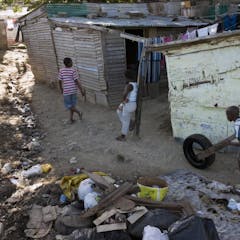
Articles on Tuberculosis (TB)
Displaying 1 - 20 of 178 articles

Two out of five cases of TB remain undiagnosed. A test using a skin patch could help change that.

Seven African countries have managed to reduce TB deaths by a third.

People have been battling tuberculosis for thousands of years, and drug-resistant strains are on the rise. Analyzing large datasets with AI can help humanity gain a crucial edge over the disease.

Antimicrobial resistance is an epidemic that kills close to 5 million people annually. The solutions are complex and must take into account the needs of the poor.

In 2021 10.6 million people developed TB and 1.6 million died from the disease. Now, for the first time in 100 years, there are promising signs of a vaccine breakthrough.

Indonesia has the world’s second-highest rates of TB – but lack of funding means not enough people are being diagnosed and treated fast enough.

Cases of tuberculosis have been detected in South Australia over the past 17 months. Here’s what you need to know about the disease.

Cancer screening and other routine primary care can help address inequities if we choose to leave the unfair status quo behind.

In South Africa men are 70% more likely to die from TB than women. Tackling social factors such as smoking and high alcohol consumption could save more lives.

TB is the single most deadly infectious killer of humankind. New research shows food and proper nutrition work like a vaccine against the disease.

Tuberculosis is a preventable and curable disease, yet before the pandemic, it killed more people than any other infectious disease.

Social enterprises need to be proactive in improving their internal processes and structures. They also need to share essential information.

Drug-resistant microbes are a serious threat for future pandemics, but the new draft of the WHO’s international pandemic agreement may not include provisions for antimicrobial resistance.

Alcohol use contributes to over 200 different diseases, injuries, and conditions. It is also a risk factor for gender-based violence and violent crime.

This whirlwind tour of social history describes how infectious diseases have shaped humanity at every stage. It suggests reducing inequality will give us our best chance of surviving future plagues.

Less than half of the children aged 0-14 who have TB are diagnosed – so they never even start treatment.

Progress in many areas of TB control stalled or reversed mainly because of the COVID-19 pandemic and the recent geo-political situations.

BCG has been around for a century, but it’s still being studied for its ‘non-specific effects’.

Ashkenazi Jews are significantly more susceptible to a rare genetic disorder known as Gaucher disease.

We need a combination of new approaches to reduce age disparate sex. And we need new technologies to protect young women.





